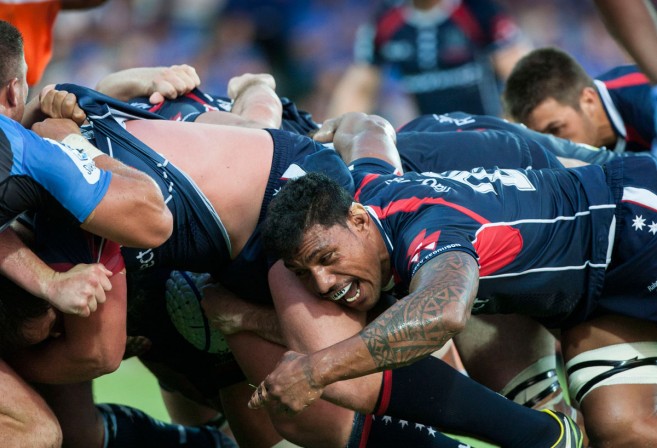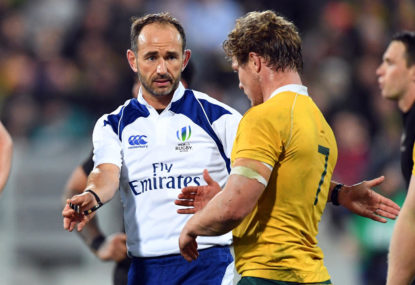The post-script of Ireland’s dramatic 27-24 win over Australia seems less about the quality of the contest and more about seeking out someone to blame.
Maybe it’s just the tired end of a long season it was just like last week’s gladiatorial Ireland versus New Zealand match for too many fans and commentators.
It’s a phenomenon that’s common in all aspects of society. Rather than take responsibility, it’s about blame.
Psychologists identify different forms of blame attribution; two of the most common being blame as a defence mechanism (avoiding your own flaws and deficiencies), and the ease of blaming someone else instead of accepting responsibility for your own actions.
It is in this context that Dean Mumm and Jerome Garces are widely held responsible for Australia losing this Test match.
For others, non-inhabitants of the blame world, this match was an epic encounter, the final result a cumulative function of random pieces of good and bad play, bounce of the ball, 50/50 calls, and the seizing and relinquishing of the initiative at key moments.
The things that typically make sport so imperfect and joyous at the same time.
Ireland dispelled any thoughts of a post New Zealand let-down, working hard early, eking out a 17 point lead which, from the run of play, actually felt like a few more.
It took nearly 40 minutes for Australia to construct a clear front-foot attacking opportunity, Michael Hooper and Israel Folau busting the midfield for Dane Haylett-Petty to score.
Haylett-Petty continues to impress as a Test player. His effort on this occasion to hold on to a difficult pass at speed was simply outstanding.
The sight of replacement Irish halfback Keiran Marmion taking up a post on the wing at the start of the second half rang alarm bells for Ireland, and while Australia weren’t able to isolate and expose him, they nevertheless enjoyed a strong twenty minutes, scoring twice and narrowly missing on other raids.
This phase included one bizarre sequence where David Pocock inserted himself at flyhalf for Ireland, to have Conor Murray obligingly pass it straight to him (correctly ruled by the referee as simply smart rugby), but for Folau in turn to selfishly ignore the scoring opportunity for Bernard Foley on his outside.
Ireland, four points down, looked to be on the rack, but they got their momentum changer courtesy of a Mumm high tackle, and an ensuing kick to the corner from the penalty. A few phases later, and Simon Zebo and Keith Earls found enough space on the left for what proved to be the winning score.
Fans aggrieved at Garces’ handling of the breakdown (Pocock and the rest of the Wallabies received no reward for their efforts) might care to look again at how Ireland focused on the cleanout, and how accurate and physical they were.
Many times Australian hands were momentarily on the ball, only to be blown off it by a green shoulder; as astute a riposte to an opponent’s strength as you’d ever see, and showing acute awareness of how Garces likes to interpret that area.
After the abject disappointment of their World Cup quarter-final, Ireland will look back at 2016 with enormous pride and satisfaction. Scalps over South Africa, New Zealand and Australia; this final victory with a side well undermanned and disrupted due to injury.
Meanwhile, Michael Cheika’s Wallabies are developing nicely and promise much for 2017 and beyond. Outside of hooker, halfback and flyhalf, there is now genuine depth and competition for places.
In truth, this side is not of the same calibre as the 1984 Wallabies, and grand slams are won only by teams at or near the top of their cycle.
That said, there is every reason for optimism for the season closer against England next week. Lopeti Timani’s non-selection for Dublin now looks like a masterstroke, particularly in light of Billy Vunipola exiting Twickenham on a medicab, with a leg injury.

Vunipola wasn’t the only one to leave the match early, referee Pascal Gauzere bookending the match with red cards for England’s Elliot Daly, for a dangerous tackle of a player in the air, and Argentina’s replacement prop Enrique Pieretto, for an ugly stomp, which the reverse TV angle suggests will earn him a lengthy suspension.
With tries immediately before and after halftime closing the deficit to 14-16, a man advantage, and all the momentum their way, Argentina had good reason for optimism.
But if England is still a little ponderous with the ball, they are nothing if not resilient, putting in a tenacious final 30 minute shift to convincingly close out the game; fullback Mike Brown looking back to his spritely best.
Predictably, they were aided by their visitors; only Argentina could respond to a man advantage by having two players yellow carded themselves, before Pieretto’s red. And Juan Martin Hernandez, playing at 10, was unable to provide sufficient poise and direction.
Argentina have regressed – that much is obvious – but there is still enough athleticism and skill within their squad if they can harness all of the players into the same game plan, one which appropriately utilises the best of their abilities.
A game plan that, it goes without saying, also involves more often playing within the laws of the game.
World rugby’s other serial law abuser, New Zealand, showed off their new, improved discipline by Brodie Retallick being penalised after just three seconds of play; after which referee Wayne Barnes proceeded to cane them repeatedly, with just as much vigour as Jaco Peyper had done in Dublin.
This match bore an uncanny resemblance to last week; hopefully this time without all of the tiresome, mostly confected, post-match bleating. France gave it everything they had, dominating possession just like the Irish, but not finding a way over the line until too late in proceedings.
Similarly, they were burned by the All Blacks; working off little possession, but striking with clinical precision at key moments, staying ahead throughout.
The All Blacks clearly identified a weakness in both Fijian wingers to deal with high and rolling kicks but, particularly in light of their possession deficit, overdid the chip-kick; the tactic mostly only allowing France the opportunity to gain confidence from playing with more ball.
At the end of a long season, rebuilding after a World Cup win, New Zealand should be well satisfied with the loss of only one game, and the emergence of players like Anton Lienert-Brown and Scott Barrett, who were both again excellent.
Captain Kieran Read finished the year with a strong match, although his decision to forgo an easy 70th minute penalty, which would have forced France to score three times to win the match, was bizarre.
Read now gets to enjoy three more November days imagining he is a porn star, before having a shave and enjoying a well earned break.
For their part, France is light years advanced of the side that was humiliated in the Cardiff World Cup semi-final. The positive signs showed against Samoa and Australia were built upon here; athletic, ball handling forwards and straight running and support play in the backs.
Prop Uini Atonio has not only stolen Charlie Faumuina’s identity, he plays like an All Black prop in the loose. And replacement halfback Baptiste Serin showed why there is a huge buzz about him, passing beautifully from the ground and then out of the back of the hand, for Louis Picamoles’ try.
On this evidence, Guy Noves has, in a short time, pulled together a team that should make the upcoming Six Nations tournament a truly compelling three-way contest.
In Cardiff, it was no surprise to see South Africa bumble along further, down 13-27 to Wales; the hole they are in way too deep to be climbed out of in a week.
Astute observers will have noticed Tonga bringing Italy back to earth, 19-17, and wondered what might happen should Tonga now be scheduled to square off against the Springboks this week?
In other results, Fiji won 38-25 against Japan, and Romania 36-10 against Uruguay. Best South Africa doesn’t go anywhere near these teams either, at least until they get a few things sorted.
Final word this week goes to Irish rugby commentator Ryle Nugent who, as the Avivia Stadium crowd was once again being whipped into a frenzy by repeated showings of Dean Mumm’s ugly, misfired clean-out, said that these types of incidents “can’t be left to the referee’s interpretation.”
What I think he meant was that players who tackle high and who tip other players up – in particular I suspect, Irish players – should be automatically red carded, and that the referee shouldn’t be allowed any discretion.
Nugent is an emotional, patriotic character and sometimes his commentary is enhanced because of it. But the downside is that it opens the door for irrational nonsense like this.
Anybody who has played rugby knows that there are any number of variables and degrees of culpability in all transgressions. In truth, Garces acted quite properly in his treatment of Mumm, just as he did with Foley at the end of the match. Just as Guazere did against Daly and Pieretto, and also Juan Pablo Estelles, against whom he did not issue a card for his tackle of an opponent in the air.
The referees got all of these important calls right. In the heat of the battle. With calm and composure, according to both the law book and the law of common sense.
Rugby is a tough, great game. Sometimes players and referees make mistakes, but most often – almost always – the better team wins.
And, win or lose, there doesn’t need to be anybody to blame for that.






























































































